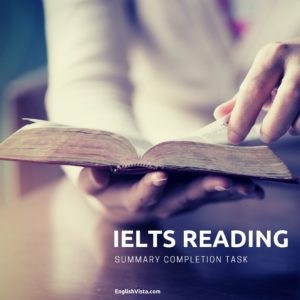
Better understanding synonyms and improving your paraphrasing ability is definitely going to help you to succeed in the IELTS Reading test.
Improving your skills in this area will help across all questions, but will particularly aid you in summary completion tasks.
Summary completion tasks require you to read a passage of text and then apply your understanding of the text to a task.
The task will either ask you to select the correct word from a list of provided words that best fit in the summary (based on the information in the main passage) or it will ask you to locate a word or words from the original text to insert into a summary in the correct place.
Tips for this task!
- The summary sentences normally follow the order of the original text. This should give you a rough idea of where to find the answer in the text.
- You don’t need to worry if you don’t understand every part of the text – as long as you can identify the main ideas and supporting facts
- The summary sentence must make grammatical sense, so consider whether the gap requires a noun, verb, adjective etc. This will help you to narrow the selection of words that would work in the gap
- Don’t spend too long reading the original passage and trying to understand every part. As long as you get the main ‘gist’ of the text, you will be able to complete the summary task
- Do plenty of synonym and paraphrasing practice ahead of the Reading test!
- Spend more of your time reading the summary sentence, finding the information in the original text and identifying the word needed to fill the gap.
- Make sure you read the instructions carefully as the exact task changes every time. Particularly pay attention to how you are asked to record your answer. Sometimes you may need to write out the word/s and at other times you may just need to write the words corresponding letter. At other times, if you are asked to find words from the original text to go in the gap, it may specify no more than one/two/three words so make sure you are choosing and recording the correct number of words!
New space discovery sheds light on how planets form
July 25, 2019
Researchers at Dartmouth College have discovered a planet orbiting one of the brightest young stars known, according to a study published in the journal The Astrophysical Journal Letters. Aged at approximately 45 million years old, the star and its planet could provide valuable information on how planetary bodies form.
Known as an exoplanet because it is outside of the solar system, the planet was found as part of NASA’s Transiting Exoplanet Survey Satellite (TESS) mission. While thousands of exoplanet discoveries have already been made, only a handful have been discovered circling relatively young stars.
The exoplanet observed in the Dartmouth research—known as DS Tuc Ab—can be considered a “pre-teen” in planetary time. The planet is no longer growing, but, because of its young age, it is still undergoing rapid changes like losing atmospheric gas as a result of the radiation coming from its host star.
Source: https://www.dartmouth.edu/press-releases/new_space_discovery_sheds_light_on_how_planets_form.html
Questions:
Find the synonyms of the words below in the passage.
- circling: _______________
- featured: _______________
- roughly: ______________
- important: ______________
- located: ____________
- few: ____________
- expanding: ____________
- giving off: _____________
Answers:
- circling: orbiting
- featured: published
- roughly: approximately
- important: valuable
- located: found
- few: handful
- expanding: growing
- giving off: losing
